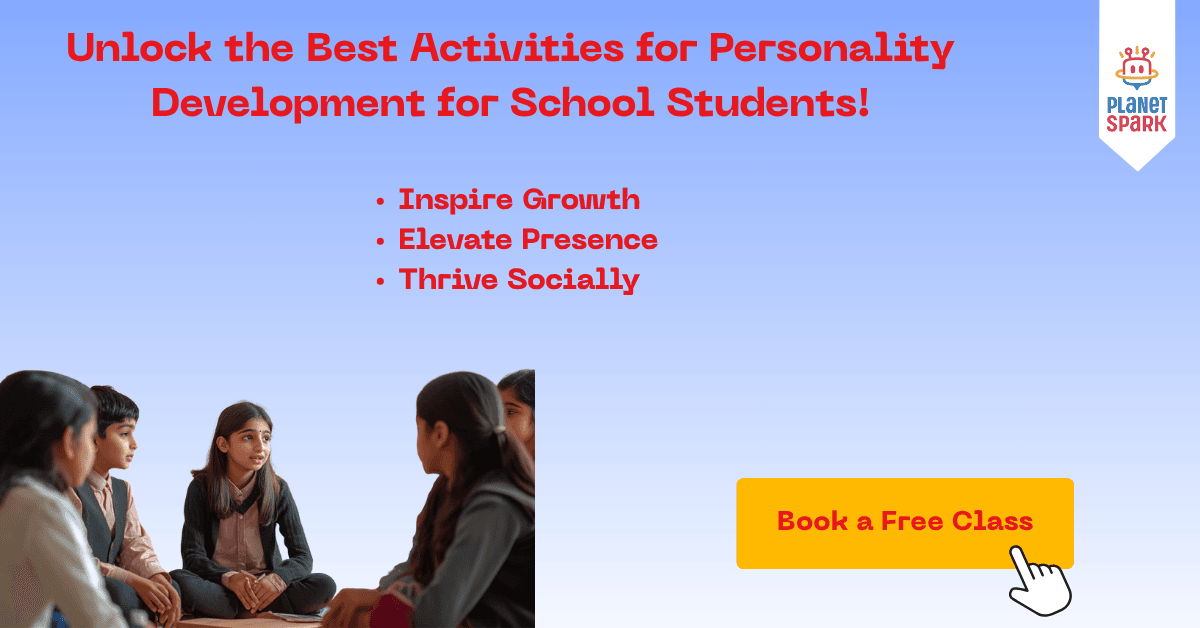Personality Development Activities Based on Personality Types
The Myers-Briggs Type Indicator (MBTI), derived from Carl Jung’s theory, categorizes personality across four dimensions:
Introversion (I) vs. Extraversion (E)
Sensing (S) vs. Intuition (N)
Thinking (T) vs. Feeling (F)
Judging (J) vs. Perceiving (P)
Let’s explore specific activities tailored for school students across key personality clusters:
1. Introverted (I) Students
Traits: Reflective, reserved, observant, recharge in solitude
Development Focus: Boost self-expression, confidence, and collaboration skills
Recommended Activities:
Creative Writing & Journaling: Helps students articulate thoughts in private before public sharing.
One-on-One Peer Interviews: Builds communication without overwhelming social pressure.
Book Clubs with Small Discussions: Encourages intellectual sharing in controlled settings.
Art-Based Expression (Drawing, Painting): Provides an outlet for emotions and inner thoughts.
Mindfulness & Breathing Exercises: Enhances internal clarity and emotional regulation.
2. Extraverted (E) Students
Traits: Outgoing, talkative, energized by interaction, action-oriented
Development Focus: Cultivate listening skills, focused thinking, and emotional empathy
Recommended Activities:
Role Plays & Drama Clubs: Builds expression, leadership, and empathy through character portrayal.
Debate Competitions: Sharpens structured thinking and verbal articulation.
Group Projects with Rotating Leadership: Encourages team synergy and responsibility.
Event Hosting or Anchoring School Assemblies: Builds confidence and public engagement.
Peer Mentoring Programs: Teaches empathy while leveraging social energy.
3. Thinking (T) Students
Traits: Logical, analytical, objective, prefers fairness over emotion
Development Focus: Nurture emotional intelligence and value-based decision-making
Recommended Activities:
STEM Challenges (Robotics, Coding, Math Quizzes): Stimulate critical thinking and innovation.
Strategic Games (Chess, Sudoku, Puzzles): Build focus and competitive spirit.
Moral Dilemma Discussions: Enhances emotional reasoning and moral judgment.
Debate with a “Feeling” Perspective Assigned: Encourages consideration of emotional impacts.
Science Fairs with Team Collaboration: Combines logic with cooperation.
4. Feeling (F) Students
Traits: Empathetic, cooperative, emotional, values harmony
Development Focus: Strengthen assertiveness, critical thinking, and emotional control
Recommended Activities:
Community Service & Volunteering: Builds compassion and leadership through action.
Circle Time Discussions: Safe space for sharing personal thoughts and listening to peers.
Storytelling or Personal Narratives: Enhances emotional articulation.
Gratitude Journals: Cultivates optimism and reflection.
Conflict Resolution Workshops: Teach healthy emotional boundaries and communication.
5. Sensing (S) Students
Traits: Practical, present-focused, detail-oriented
Development Focus: Encourage creativity, big-picture thinking, and imagination
Recommended Activities:
Hands-on Experiments: Makes learning tangible and engaging.
Field Trips & Real-World Learning Projects: Stimulate sensory exploration.
Observation Games (Memory Recall, Scavenger Hunts): Boosts attention to detail.
Model-Making or DIY Crafts: Reinforces structured creativity.
Descriptive Writing Exercises: Bridges real-life detail with expression.
6. Intuitive (N) Students
Traits: Imaginative, abstract, future-focused
Development Focus: Ground ideas with action, focus on step-by-step execution
Recommended Activities:
Creative Writing and Poetry: Encourages imaginative self-expression.
Innovation Challenges (Invent Something New): Engages futuristic and abstract thinking.
Goal-Setting Workshops: Converts vision into actionable steps.
Metaphor-Based Learning (e.g., “Life is a journey”): Explores depth through symbolism.
Vision Board Creation: Promotes clarity in ambition and planning.
7. Judging (J) Students
Traits: Organized, decisive, structured, prefers planning
Development Focus: Foster adaptability, creativity, and open-mindedness
Recommended Activities:
Time Management Games: Develop productivity and flexibility under deadlines.
Planned Event Execution (Fairs, Exhibitions): Strengthens organizational leadership.
Role Reversal Scenarios: Teaches adaptability by seeing different viewpoints.
Improvisation Games: Helps with spontaneity and creative problem-solving.
Daily Planner Journaling: Reinforces structured thinking with self-reflection.
8. Perceiving (P) Students
Traits: Flexible, spontaneous, adaptable, curious
Development Focus: Improve focus, goal-orientation, and follow-through
Recommended Activities:
Project-Based Learning with Milestones: Encourages commitment to outcomes.
Idea Brainstorming Sessions: Harness creativity productively.
Choose-Your-Own-Adventure Activities: Emphasizes decision-making.
Flexible Group Discussions: Balances openness with structure.
Mini Deadlines in Long Projects: Builds accountability and time sense.
Book a free trial class with PlanetSpark today and kickstart your child’s personality development journey!
Personality Development Activities Based on Personality Types and Age Groups
Understanding that each child has a unique personality is essential for tailoring development activities. The Jungian and Myers-Briggs (MBTI) framework identifies 16 personality types based on four dichotomies:
Introversion (I) vs. Extraversion (E)
Sensing (S) vs. Intuition (N)
Thinking (T) vs. Feeling (F)
Judging (J) vs. Perceiving (P)
Here’s how to structure personality development activities based on both personality types and age groups.
A. Elementary School (Ages 6–10)
Goal: Build basic communication, self-awareness, empathy, and creativity.
1. Introverted Children (I)
Activities: Solo creative projects (drawing, storytelling), emotion journaling, mindfulness games.
Purpose: Build confidence in self-expression without pressure.
2. Extraverted Children (E)
Activities: Group storytelling, role-playing games, leadership in group projects.
Purpose: Channel social energy productively and practice empathy.
3. Feeling (F) Personality Types
Activities: “Emotion charades,” gratitude circles, kindness boards.
Purpose: Enhance emotional vocabulary and understanding of others.
4. Sensing (S) Children
Activities: Memory games, sensory-based learning activities (touch-and-feel boxes), hands-on tasks.
Purpose: Strengthen observation skills and awareness.
B. Middle School (Ages 11–13)
Goal: Cultivate leadership, emotional intelligence, and communication.
1. Thinking (T) Personality Types
Activities: Debate clubs, logic puzzles, ethical dilemma discussions.
Purpose: Develop reasoning skills and empathy for opposing views.
2. Intuitive (N) Personality Types
Activities: Innovation projects, vision board creation, creative writing.
Purpose: Encourage abstract thinking and goal setting.
3. Judging (J) Personality Types
Activities: Time management workshops, planner use, goal tracking.
Purpose: Improve planning and execution.
4. Perceiving (P) Personality Types
Activities: Improvisation games, adventure-based tasks, flexible project deadlines.
Purpose: Foster adaptability and follow-through.
C. High School (Ages 14–17)
Goal: Refine career readiness, communication, leadership, and self-reflection.
1. Introverts (I)
Activities: Blogging, structured presentations, 1:1 mentoring.
Purpose: Develop public speaking in low-pressure formats.
2. Extraverts (E)
Activities: Team projects, event planning, Model UN participation.
Purpose: Hone leadership while promoting collaborative skills.
3. Sensing (S) vs. Intuition (N)
Sensing Activities: Career path simulations, real-world application exercises.
Intuition Activities: Entrepreneurial thinking sessions, future mapping workshops.
4. Feeling (F) vs. Thinking (T)
Feeling Activities: Peer mentoring, social-emotional journaling.
Thinking Activities: Problem-solving boot camps, competitive challenges.
Expert Opinions on Personality Development
Carl Jung, founder of analytical psychology, emphasized individuation—developing the self through integration of personality aspects.
Isabel Briggs Myers stated: “We cannot change who we are, but we can improve how we use our personality.”
Daniel Goleman, emotional intelligence researcher, highlighted: “Success depends more on EQ than IQ,” especially in school-age development.
Guidelines to Develop Each Personality Type Effectively
| Personality Type | Development Strategy |
|---|---|
| Introvert (I) | Provide reflective tasks, gradually introduce public speaking, 1-on-1 mentorship. |
| Extravert (E) | Encourage structured leadership, emotional regulation exercises, active listening drills. |
| Thinking (T) | Develop interpersonal empathy, involve in community service or team feedback loops. |
| Feeling (F) | Teach logical decision-making through structured arguments or debate. |
| Sensing (S) | Use detail-oriented tasks and real-life applications to enhance focus. |
| Intuitive (N) | Foster visionary thinking, encourage innovation contests or long-term projects. |
| Judging (J) | Assign clear goals and structured timelines; nurture leadership in planning. |
| Perceiving (P) | Allow open-ended exploration, teach prioritization and time management tools. |



